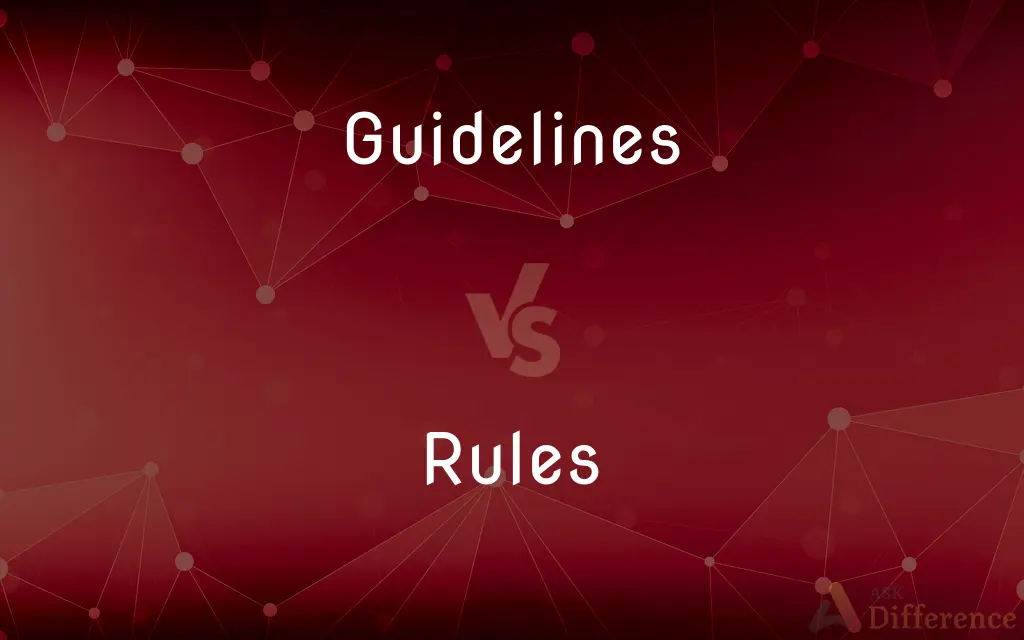Guidelines vs. Rules — What's the Difference?
By Tayyaba Rehman — Published on October 18, 2023
Guidelines offer suggestions or advice, whereas rules are strict mandates that must be followed. Both provide a framework for behavior or action.

Difference Between Guidelines and Rules
Table of Contents
ADVERTISEMENT
Key Differences
Guidelines: These are recommendations that advise a course of action or elucidate certain standards. However, unlike rules, guidelines provide flexibility, allowing individual discretion in certain situations.
Rules: In contrast, rules are definitive directives that dictate specific behavior or action. Rules are typically non-negotiable and carry consequences when not followed, whereas guidelines might not have punitive measures.
Function and Intent: Guidelines usually aim to guide behavior or decisions by providing best practices, often emphasizing an optimal or preferred method. Rules, however, emphasize must-do's and must-not-do's, setting clear boundaries and expectations.
Origin and Evolution: Guidelines often evolve from collective experiences, best practices, and expert consensus, aiming for general betterment. Rules, conversely, might be established by authoritative bodies or institutions to maintain order and ensure specific standards.
Flexibility vs. Rigidity: The primary distinction between guidelines and rules lies in their flexibility. Guidelines allow wiggle room for interpretation based on circumstances, while rules demand adherence without deviation.
ADVERTISEMENT
Comparison Chart
Nature
Advisory
Mandatory
Flexibility
Often flexible
Typically rigid
Consequences of Non-adherence
Generally no strict penalties
Often has penalties or consequences
Purpose
To offer best practices or recommendations
To establish clear, non-negotiable standards
Creation
Developed from consensus or expert advice
Formulated by authority for order and standardization
Compare with Definitions
Guidelines
Recommendations provided for best practices.
The health department issued dietary guidelines for better nutrition.
Rules
Regulations set by authorities.
The league set strict rules to ensure fair competition.
Guidelines
A set of general rules or principles.
Following the design guidelines, the team created a cohesive website.
Rules
Criteria determining the correctness of actions.
Grammar rules help standardize written language.
Guidelines
Advice given for specific situations or actions.
The manual provided guidelines for operating the machinery safely.
Rules
Preset, established directives governing actions.
The school's rules prohibited any form of bullying.
Guidelines
Reference points that aid decision-making.
The company provided ethical guidelines to its employees.
Rules
Standards to which behavior should conform.
Breaking the rules can lead to severe consequences.
Guidelines
Non-mandatory instructions to guide actions.
Environmental guidelines suggested businesses reduce plastic use.
Rules
Commands or orders that must be obeyed.
The judge's rules were clear and non-negotiable.
Guidelines
A statement or other indication of policy or procedure by which to determine a course of action
Guidelines for the completion of tax returns.
Rules
Governing power or its possession or use; authority.
Guidelines
Plural of guideline
Rules
The duration of such power.
Guidelines
A rule or set of rules giving guidance on how to behave in a situation.
Rules
An authoritative, prescribed direction for conduct, especially one of the regulations governing procedure in a legislative body or a regulation observed by the players in a game, sport, or contest.
Rules
The body of regulations prescribed by the founder of a religious order for governing the conduct of its members.
Rules
A usual, customary, or generalized course of action or behavior
"The rule of life in the defense bar ordinarily is to go along and get along" (Scott Turow).
Rules
A generalized statement that describes what is true in most or all cases
In this office, hard work is the rule, not the exception.
Rules
(Mathematics) A standard method or procedure for solving a class of problems.
Rules
A court decision serving as a precedent for subsequent cases
The Miranda rule.
Rules
A legal doctrine or principle.
Rules
A court order.
Rules
A minor regulation or law.
Rules
A statute or regulation governing the court process
Rule of procedure.
Rule of evidence.
Rules
See ruler.
Rules
(Printing) A thin metal strip of various widths and designs, used to print borders or lines, as between columns.
Rules
To exercise control, dominion, or direction over; govern
Rule a kingdom.
Rules
To have a powerful influence over; dominate
"Many found the lanky westerner naive, and supposed that he would be ruled by one of his more commanding cabinet officers" (William Marvel).
Rules
To be a preeminent or dominant factor in
"It was a place where ... middle-class life was ruled by a hankering for all things foreign" (Amitav Ghosh).
Rules
To decide or declare authoritatively or judicially; decree
The judges ruled that the answer was acceptable. The police ruled the death a homicide. The law was ruled unconstitutional.
Rules
To mark with straight parallel lines.
Rules
To mark (a straight line), as with a ruler.
Rules
To be in total control or command; exercise supreme authority.
Rules
To formulate and issue a decree or decision.
Rules
To prevail at a particular level or rate
Prices ruled low.
Rules
(Slang) To be excellent or superior
That new video game rules!.
Rules
Plural of rule
Common Curiosities
Can one organization have both guidelines and rules?
Absolutely, many organizations have both to provide direction and set boundaries.
What happens if rules are broken?
Breaking rules often carries consequences or penalties.
Can guidelines become rules?
Yes, over time, guidelines can evolve into rules, especially if consistently adopted.
Are guidelines and rules static?
Both can evolve over time based on experiences, though rules might be more stable.
Is it possible for rules to contradict guidelines?
Rarely, but in cases of conflict, rules generally take precedence.
Are guidelines less important than rules?
Not necessarily; guidelines provide valuable advice, while rules mandate actions.
In legal contexts, which holds more weight: rules or guidelines?
In legal scenarios, rules typically hold more weight than guidelines.
How are new rules introduced?
New rules can emerge from changing circumstances, authoritative decisions, or the evolution of guidelines.
Are guidelines mandatory like rules?
No, guidelines are advisory, whereas rules are typically mandatory.
Are guidelines typically detailed?
Guidelines can range from general advice to detailed instructions.
Can rules ever offer flexibility?
While rules are rigid by nature, exceptions or amendments might be made in certain contexts.
Do guidelines provide a reasoning behind the advice?
Often, guidelines come with explanations or rationale for the recommendations.
Who usually sets the rules?
Rules are typically set by authoritative bodies or governing institutions.
Why might an organization prefer guidelines over rules?
Guidelines allow more flexibility and discretion in decision-making.
Do all rules have consequences?
Most rules carry consequences for non-compliance, but the severity can vary.
Share Your Discovery

Previous Comparison
Peanut Butter vs. Jam
Next Comparison
Cholecystitis vs. CholelithiasisAuthor Spotlight
Written by
Tayyaba RehmanTayyaba Rehman is a distinguished writer, currently serving as a primary contributor to askdifference.com. As a researcher in semantics and etymology, Tayyaba's passion for the complexity of languages and their distinctions has found a perfect home on the platform. Tayyaba delves into the intricacies of language, distinguishing between commonly confused words and phrases, thereby providing clarity for readers worldwide.














































